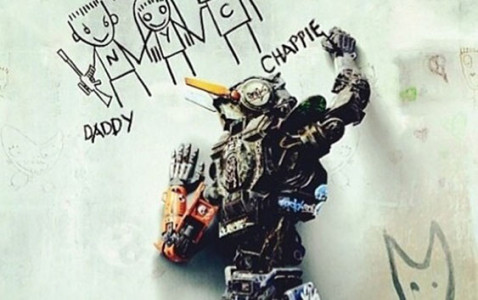Chappie (2015)
Director: Neill Blomkamp
Screenwriters: Neill Blomkamp, Terri Tatchell
Starring: Sharlto Copley, Dev Patel, Hugh Jackman, Sigourney Weaver, Ninja, Yo-Landi Visser
Neill Blomkamp’s latest socially conscious low key sci-fi, Chappie (2015), felt like a film torn between two ideals. The first was that it wanted to be an in-your-face adult shoot-em-up filled with explosions and other effects driven set pieces; the second was that it wanted to be a socially conscious piece that cast an eye on the threat of corporations and the weapons industry while highlighting poverty and the prejudices towards the poor that come with it. One could argue that this would be a great recipe for success in the contemporary Hollywood market, yet the film has bombed at the box office and left a lot of critics on the fence with regard to whether or not it’s any good.
Chappie kicks off with an action sequence that is no more spectacular than the average blockbuster or action-comedy gun fight/chase scene. Sure, a Hans Zimmer score and a whole heap of blood, death, and helicopters, should be enough, but under Blomkamp’s supervision it seems far from special. The opening sequence feels like the pre-credit scene to an episode of ‘CSI’; setting the backstory of the key protagonists and antagonists in place so that the rest of the film needn’t explain it to us. It felt contrived, as if Blomkamp was ticking the boxes he needed to in order to get funding for what was otherwise a well put together movie that used sci-fi tropes such as ‘what it is to be human’ in order to develop as a character driven piece.
Mark Kermode, in his review for theguardian.com, described the character-driven aspect of the film as “too cute for older viewers more interested in the head-bangingly orchestrated guns and ’splosions”. Chappie not only highlights the development of consciousness in its central character (which can be considered cute given its child-like tendencies, granted,) but it also at least tries to present layered secondary characters of whom it is difficult to not care for by the end of the film. One character in particular – Ninja (Ninja) – was developed as a means of highlighting the abnormality of his poverty-stricken existence. While his character, and the other “gangster” characters that are often the central focus of this picture are well presented, they could still have been developed further.
More so, Dev Patel’s character Deon Wilson and Hugh Jackman’s character Vincent Moore, were absent of any kind of development and were painted as the ultimate good and evil with very little by the way of reason to care about either of them; a huge flaw in the movies’ script. In fact, Jackman’s character was so under-developed that he was painted as no more than a Rugby ball-obsessed and God-fearing hot head, whose only real motivation was jealousy and greed. This was a real shame and really highlighted how disjointed the film felt. On the one hand there was a relatively well thought out character development for Chappie and the “gangsters”, but on the other there was no character development for the ‘corporation/weapons industry’ storyline’s characters, reinforcing how it felt like this element had been thrown in as a means of getting funding or appealing to a wider demographic. Even here, in the absence of a storyline element – character development – the story felt contrived as if developed to purposefully avoid such a thing in order to gain mass acceptance, which was obviously very far removed from Blomkamp’s first picture District 9.
In contrast, the sentient being Chappie was lovable. He was a child who developed into an adult on screen and was presented with such awesome special effects work that it was almost unnoticeable that he wasn’t a real-life person being photographed. Sharlto Copley excelled in the role and has been been almost universally praised for his performance, making his portrayal of the character one of the more intriguing aspects of the film and undoubtedly one of the bigger selling points to anyone who is yet to see it.
It was also great that Johannesburg was used as a location for the picture. Even today, in 2015, South Africa and the African continent as a whole, are exotic to the vast majority of worldwide audiences, and that’s why it worked as the backdrop for this film. Chappie, set in the “near future”, used the exotic feel of Johannesburg to present an image of a dystopian future not unlike that of another Blomkamp movie, Elysium (2013). This use of an unfamiliar city helped to characterise the time period, juxtaposing the vast majority of gadgets and vehicles that have been seen as the norm in contemporary western society for some time.
The score and soundtrack to the movie were excellent. At particular points it very much felt like one of Chrisopher Nolan’s Batman movies. German composer Hans Zimmer left his indelible stamp on the film and was used as an appropriate opposition to the extreme dance-rap sound of Die Antwoord’s “Happy So Sucky Fucky”.
In conclusion, Chappie was torn and in many respects less than impressive. Technically speaking, a lot more could have been done to improve the finished product and there’s no doubting that Chappie is Blomkamp’s worst picture of his short career thus far. While this film may not stand up against the all-time great sci-fi character pieces like Robocop and Blade Runner, it will certainly be a much more enjoyable experience than the vast majority of Summer blockbusters and should therefore be considered a mild success critically, even if it hasn’t been a success at the box office.
14/24


